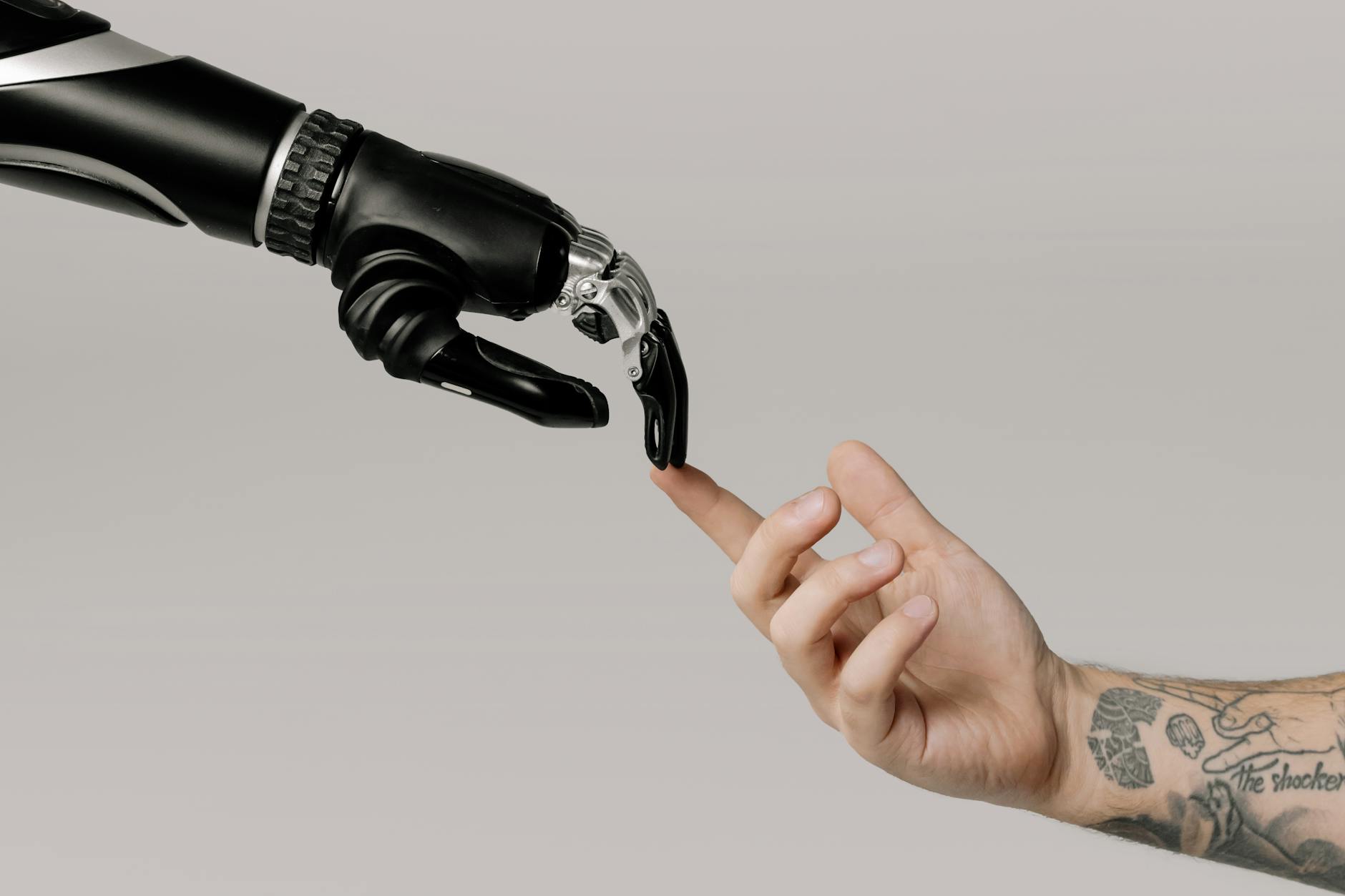
Artificial Intelligence (AI) is changing the way we interact with technology every day. One of the most exciting areas of impact is how AI personalizes our experience with apps. From suggesting new music perfectly suited to your taste to curating news that aligns with your interests, AI is making apps smarter and more intuitive.
Gone are the days when one-size-fits-all was the norm. Today, AI tailors each app experience to individual users, creating a unique and engaging interaction every time you open an app. Understanding how AI drives this personalization can help you appreciate the technology behind your favorite apps and how it makes your life easier.
In this post, we’ll explore how AI is becoming an integral part of user experience in apps, making interactions more personalized and efficient. You’ll learn about the latest AI advancements and how they’re set to make your app usage feel like it was designed just for you.
The Growing Role of AI in App Development
Artificial Intelligence (AI) has been shaping how apps are developed and how users interact with them. The impact of AI is immense, making our app experiences more intuitive and personalized. Let’s take a closer look at how AI’s role in app development has evolved and explore the current trends driving this innovation.
Historical Context
The journey of AI in app development started years ago, but its significant milestones are worth noting. In the early days, AI was more of an exotic concept confined to research labs. Fast forward to the 2010s, AI technologies like machine learning and neural networks began to gain traction. Companies like Google and Apple incorporated basic AI features, such as voice recognition and predictive text, into their apps.
Over the years:
- Early 2000s: Basic AI features like spam filters and simple recommendation systems appeared.
- 2010s: Machine learning algorithms improved app functionalities like image and voice recognition.
- 2020s: The rise of deep learning and AI-driven analytics has brought about highly personalized user experiences.
Today, AI is an indispensable tool in app development, driving innovations that were once thought impossible.
Current Trends
AI-driven personalization in apps is not just a futuristic idea; it’s happening now. Several notable trends have emerged that highlight how AI is shaping the app development sector.
- Personalized Content Recommendations: Apps use AI algorithms to analyze user behavior and preferences. For example, Netflix’s recommendation engine suggests movies and TV shows based on your viewing history, making scrolling through endless content a thing of the past.
- Virtual Assistants: AI-powered virtual assistants like Siri, Google Assistant, and Alexa are becoming more sophisticated. They not only answer queries but also offer personalized suggestions, manage schedules, and even control smart home devices.
- Chatbots and Customer Service: Many apps now incorporate AI chatbots to handle customer service inquiries. These chatbots provide instant responses and can learn from past interactions to offer more accurate and helpful replies over time.
- Predictive Insights: AI helps apps predict user needs before they express them. Health apps, for example, can forecast potential health issues based on user data, providing timely advice and reminders.
- Enhanced Security: AI improves app security through continuous learning. It can detect unusual patterns and potential threats, offering users a safer experience.
According to a report by MarketsandMarkets, the global AI market size will grow from $58.3 billion in 2021 to $309.6 billion by 2026, at a compound annual growth rate (CAGR) of 39.7%. This explosive growth underscores the increasing reliance on AI in app development.
 Photo by cottonbro studio
Photo by cottonbro studio
These trends highlight how AI is making apps more responsive and personalized, enhancing overall user satisfaction and engagement. The future holds even more possibilities as AI continues to evolve and integrate with app development.
Personalizing User Experience through AI
Artificial Intelligence (AI) is revolutionizing how we use apps, making them more intuitive and personalized than ever before. The magic lies in how AI tailors these experiences based on our individual preferences, behaviors, and needs. Let’s dive into some key areas where AI is making a significant impact.
Behavioral Analysis: Explain how AI analyzes user behavior to tailor experiences.
AI has a keen eye for details. By tracking user interactions, it can analyze patterns and behaviors to create a tailored experience. Think of it as having a personal assistant who understands your likes, dislikes, and habits.
For example:
- Browsing History: AI analyzes the pages you visit, how long you stay, and what actions you take. This data helps create a profile of your preferences.
- Interaction Patterns: How you interact with app features, such as the buttons you press and the settings you adjust, informs AI about your preferences.
- Content Consumption: AI tracks the type of content you engage with the most, whether it’s videos, articles, or images, and adjusts the app interface to highlight similar content.
By piecing together these behaviors, AI can predict what you might like or need next, making your app experience smoother and more enjoyable.
Recommendation Systems: Describe the role of AI in creating personalized recommendation systems.
One of the standout features of AI in apps is its ability to provide personalized recommendations. Whether you’re using a music streaming service, shopping app, or social media platform, AI’s recommendation systems are working behind the scenes to make your experience better.
Here’s how it works:
- Data Collection: AI gathers data on your past interactions, preferences, and behaviors.
- Pattern Recognition: It identifies patterns in your data to understand your interests.
- Content Matching: AI matches new and relevant content to these patterns, suggesting items you’re likely to enjoy.
For instance, Spotify uses AI to recommend songs and playlists based on your listening history. Similarly, Amazon suggests products based on your past purchases and browsing history.
 Photo by Google DeepMind
Photo by Google DeepMind
Adaptive Interfaces: Discuss how AI-driven adaptive interfaces enhance user interaction.
Adaptive interfaces are the unsung heroes of modern app design. These interfaces change in real-time to meet your preferences and needs, thanks to AI.
Consider these scenarios:
- Dynamic Layouts: Based on your usage patterns, AI can rearrange the app layout to better suit how you navigate. For example, frequently used features might be moved to more accessible positions.
- Contextual Menus: AI can offer menus that change based on your current activity or location. If you’re at a grocery store, your shopping list app might prioritize the items you usually buy there.
- Customized Notifications: Rather than bombarding you with generic notifications, AI ensures you only receive alerts that are relevant to you. It learns when you’re most active and tailors notifications accordingly.
An example of adaptive interfaces in action is Google Maps. It adjusts its interface based on your travel patterns, offering shortcuts to places you frequently visit and providing real-time traffic updates.
AI’s role in personalizing user experiences through behavioral analysis, recommendation systems, and adaptive interfaces is transforming how we interact with apps. These innovations make our digital lives more seamless, efficient, and enjoyable. Stay tuned as we uncover more ways AI is shaping the future of app development.
Benefits of AI Personalization in Apps
Artificial Intelligence (AI) is transforming how we interact with apps by tailoring experiences to fit our individual needs. This personalization has several benefits, from keeping users engaged to boosting satisfaction and conversion rates. Let’s look at how AI personalization is making a difference.
Enhanced User Engagement
Personalized experiences can significantly increase user engagement and retention. When an app understands your preferences, it can tailor its content and features to suit you better.
- Relevant Content: AI algorithms analyze your behavior to offer content that matches your interests, like customized news feeds or music playlists.
- Timely Notifications: Personalized notifications reach you when you’re most likely to engage, based on your activity patterns.
- Interactive Features: Adaptive interfaces change to meet your preferences, making app interactions more enjoyable and efficient.
For instance, think about how Netflix keeps you glued to your screen by suggesting new shows and movies that align with your viewing history.
Improved Customer Satisfaction
When an app feels personally catered to your needs, your satisfaction with it naturally increases.
- Simple Navigation: AI can simplify navigation by rearranging app layouts according to how you use them.
- Responsive Support: AI-driven chatbots offer quick, personalized help, which reduces response times and improves user experience.
- Ease of Use: Features like predictive text and auto-fill streamline tasks, making apps easier to use.
AI-powered personalization makes the app experience feel smoother and more intuitive, like having a concierge service that knows exactly what you want.
Increased Conversion Rates
Personalized app experiences don’t just make users happy; they also drive higher conversion rates.
- Targeted Offers: AI can suggest products or services based on your past purchases, increasing the likelihood of making a sale.
- Personalized Recommendations: Recommendation systems guide you to content or products you’re more likely to enjoy, encouraging you to take action.
- Streamlined Customer Journey: By anticipating your needs, AI can guide you through the customer journey more efficiently, reducing friction and increasing conversions.
For example, Amazon’s AI recommendations often lead users to discover products they didn’t know they needed, boosting their impulse purchases.
 Photo by Gaspar Zaldo
Photo by Gaspar Zaldo
AI personalization enhances user engagement, improves satisfaction, and increases conversion rates, making apps smarter and more attuned to individual needs.
Challenges and Ethical Considerations
While AI brings a lot of good to personalizing user experiences in apps, it also presents challenges and ethical issues. These need to be taken seriously to build trust and ensure fairness.
Data Privacy Concerns
 Photo by Fauxels
Photo by Fauxels
Data privacy is a big deal when it comes to AI-driven apps. When apps use AI to personalize your experience, they collect a lot of data about you.
- Personal Information: Apps gather data like your location, browsing history, and even voice recordings. This data is used to make your experience smoother, but if it falls into the wrong hands, it can be misused.
- Data Storage and Security: Keeping this data safe is crucial. Companies need to ensure that their servers are secure, and they must follow strict guidelines to protect user data.
- User Consent: Always look for apps that are transparent about what data they collect and how they use it. Make sure you have the option to opt-out of data collection if you’re uncomfortable.
Data privacy is not just about compliance; it’s about respecting users’ rights and earning their trust.
Bias in AI Algorithms
 Photo by Pixabay
Photo by Pixabay
AI algorithms can sometimes show bias, which can lead to unfair or inaccurate results.
- Training Data: AI systems learn from data. If the training data has biases, the AI will likely reproduce those biases. For example, an AI trained mainly on data from one ethnic group may perform poorly on others.
- Impact on Personalization: Bias can affect how personalized recommendations are made. If the AI has biased training data, it might not offer diverse suggestions, affecting the user experience.
- Continuous Monitoring: Developers need to continually check algorithms for bias. This means regularly updating training data and refining the algorithms to be more inclusive.
By addressing bias, we can make AI more fair and beneficial for everyone.
User Trust and Transparency
Gaining and keeping user trust is key for AI-driven personalization.
- Clear Communication: Users should know how and why their data is being used. Clear, understandable privacy policies are a must.
- Transparency: Explain the benefits and limitations of AI in your app. Users should feel confident that the AI is working to improve their experience, not just collecting their data.
- Feedback Mechanisms: Allow users to provide feedback on the AI’s performance. This helps improve the system and shows users that their opinions matter.
 Photo by Ron Lach
Photo by Ron Lach
Building user trust is essential for the success of AI in apps. By being transparent and ethical, developers can create a better, more personalized user experience.
Future of AI in Personalizing User Experience
The ever-evolving field of Artificial Intelligence (AI) promises to make app user experiences even more personalized. As we look toward the future, several emerging technologies and potential innovations are set to revolutionize how we interact with our favorite apps.
Emerging Technologies
Emerging technologies are poised to take AI-driven personalization to new heights. These advancements will further enhance how apps understand and cater to individual user needs.
 Photo by Michelangelo Buonarroti
Photo by Michelangelo Buonarroti
- 5G Connectivity: The rollout of 5G networks will supercharge the speed and reliability of AI applications in apps. This high-speed network will enable real-time data processing, making AI-driven personalization faster and more efficient. Imagine an app that changes the user interface instantly based on your emotional state detected through wearable sensors.
- Augmented Reality (AR) and Virtual Reality (VR): AR and VR technologies are becoming more integrated with AI. This combo will offer personalized, immersive experiences. For example, shopping apps could use AR to show how furniture looks in your home, tailored to your style and preferences.
- Natural Language Processing (NLP): AI systems are getting better at understanding and generating human language. Future apps will feature advanced voice assistants that offer more nuanced and contextually relevant recommendations. Picture an AI assistant that not only understands your commands but can also engage in meaningful conversations about your preferences.
- Edge Computing: With edge computing, data processing happens closer to the source of data, reducing latency. This means AI can personalize user experiences on the fly, even without a constant internet connection. For instance, a fitness app could provide real-time coaching based on your performance metrics collected through wearable devices.
Potential Innovations
The horizon of AI-driven personalization is filled with exciting possibilities. These potential innovations could redefine how we use apps in the future.
- Emotion AI: Future apps might be able to read and respond to your emotions in real-time. Using facial recognition and voice analysis, AI could detect your mood and adjust the app experience accordingly. Feeling stressed? Your meditation app could automatically suggest a calming playlist and visualize tranquil scenes.
- Hyper-Personalization: Going beyond basic personalization, hyper-personalization leverages big data to create highly customized experiences. Imagine a news app that not only curates articles based on your reading habits but also adjusts the tone and complexity of the content to fit your reading level.
- Predictive Personalization: This involves AI predicting what you might want or need before you even realize it. For example, travel apps could suggest packing lists based on your destination’s weather forecast and your past travel habits.
- Context-Aware Personalization: Apps will become more adept at understanding the context in which they are used. A cooking app could adjust its recipes based on the ingredients you have on hand and your past cooking techniques.
AI is set to continue transforming how we interact with apps, making personalized user experiences more intuitive, responsive, and enjoyable. As these emerging technologies and potential innovations develop, the future of AI-driven personalization looks incredibly promising.
Conclusion
AI is fundamentally changing how we interact with apps, making our experiences more personalized and engaging. By analyzing user behavior, providing tailored recommendations, and creating adaptive interfaces, AI ensures that each interaction feels unique and relevant.
The benefits are clear—enhanced user engagement, improved satisfaction, and higher conversion rates. However, it’s crucial to address challenges like data privacy, algorithmic bias, and user trust to fully harness AI’s potential.
As AI continues to evolve, the future looks promising for even more personalized and intuitive app experiences. In a world where technology moves quickly, AI-driven personalization stands out as a key driver of innovation and user satisfaction.






Leave a Reply